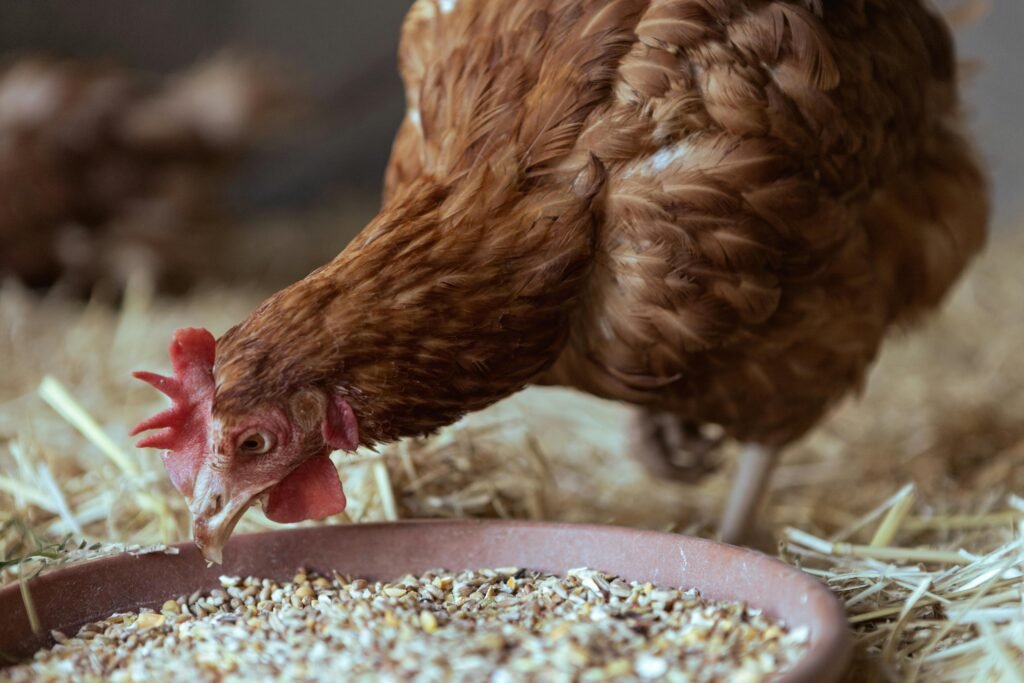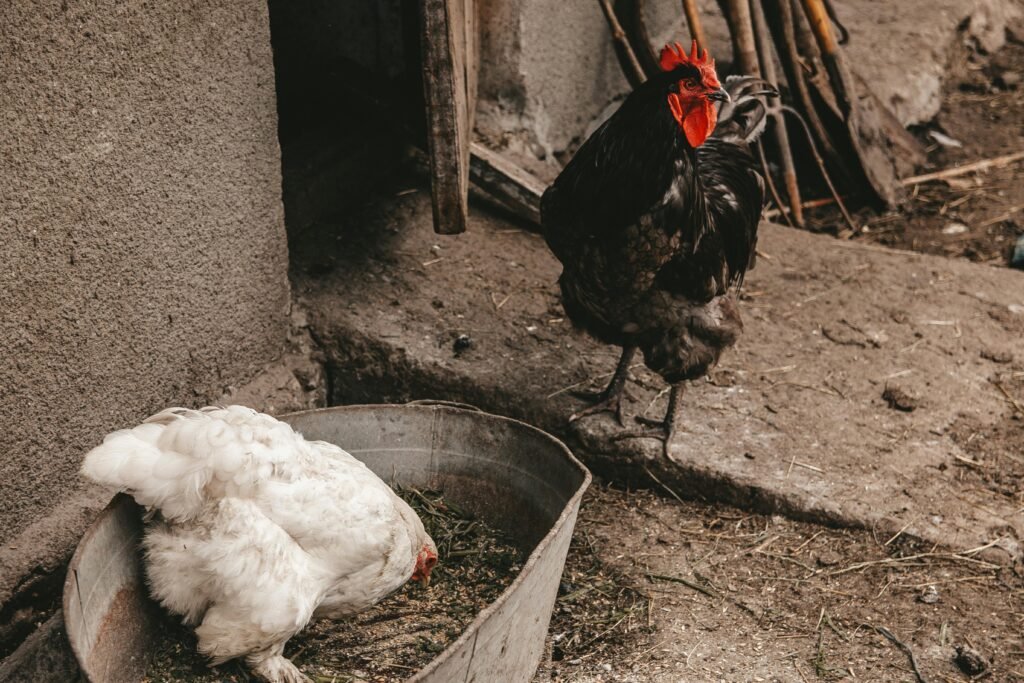If you’re a backyard chicken enthusiast, you’ve probably found yourself wondering: what can chickens eat? While a good poultry feed can keep them healthy, many chicken keepers enjoy treating their feathered friends to some natural goodies like fruits and veggies. With so many options available, though, it can be tricky to figure out what’s safe for them to munch on.
In this article, we’ll dive into what chickens can eat, pointing out which foods are safe, which ones to avoid, and what should only be given in moderation. You’ll get clear answers to popular questions like whether chickens can eat grapes, tomatoes, bananas, and a whole lot more all aimed at keeping your flock happy and thriving!
What Do Chickens Eat?
When it comes to a chicken’s diet, the foundation should be a well-rounded layer feed packed with all the vital nutrients like protein, calcium, and fiber. But what about other foods? Can chickens munch on vegetables, grains, and fruits? Absolutely! They love a diverse menu.

Chickens can happily snack on leafy greens, cooked rice, oats, cucumbers, pumpkin, watermelon, and even a little yogurt now and then. Just remember, moderation is key. If you’re ever curious about whether chickens can have kitchen scraps, it really depends on what’s in those scraps. Steer clear of anything salty, sugary, or moldy.
And when you’re treating your feathered friends, keep this in mind: no matter how delicious a food might seem, always ask yourself if it’s safe for chickens. If the answer is yes and the food is fresh, natural, and non-toxic, feel free to share!
Can Chickens Eat Grapes?
Absolutely, chickens can munch on grapes, and let me tell you, they really enjoy them! Grapes are not only juicy and sweet but also packed with water, making them a fantastic treat on those hot summer days. But you might be wondering: how many grapes are safe for our feathery friends?
Because grapes are high in sugar, it’s best to give them in moderation. Just one or two small pieces per chicken is plenty. Whether you slice them up or serve them whole (as long as they’re seedless), just make sure they’re nice and clean. So, can chickens safely enjoy grapes? Definitely just remember to treat them to this snack occasionally, rather than making it a daily habit!
Can Chickens Eat Tomatoes?
Tomatoes are a common topic of curiosity for chicken owners. So, can chickens eat tomatoes without any worries? Absolutely but stick to the ripe ones.
Chickens can safely enjoy ripe red tomatoes, which are packed with vitamins A and C, plus they offer a nice boost of antioxidants. Just be cautious with unripe green tomatoes and the leaves, as they contain solanine, a substance that can be harmful to chickens. If you’re picking tomatoes from your garden, ensure they’re fully ripe. And remember to always ask: can chickens eat this part of the plant? If you’re unsure, it’s best to skip it.
Can Chickens Eat Bananas?
Bananas are soft, sweet, and loaded with potassium, but can chickens munch on them without any tummy troubles?
Yes, chickens can eat bananas! Most of them really like the squishy texture, especially when the bananas are a bit overripe. Just keep in mind that bananas are pretty high in natural sugars, so it’s best to offer them in moderation. Too many can upset their stomachs and might even lead to weight gain, especially for chickens that are kept in smaller spaces.
You might also end up with a sticky mess if you give them too much at once. A few small pieces per bird should do the trick. So, can chickens eat bananas? For sure just make sure it’s in small, controlled amounts!
Can Chickens Eat Pineapple?
When it comes to tropical fruits, pineapples can be a bit of a puzzle. Can chickens munch on pineapple without messing up their tummies?
The good news is that chickens can enjoy pineapple in moderation. It’s packed with vitamins and has bromelain, an enzyme that might actually aid digestion in small amounts. But be careful—pineapple is also quite acidic and fibrous. If they eat too much, it could upset their stomach or even lead to diarrhea. Always serve pineapple in small, chopped pieces, and steer clear of the hard core and tough skin. So, the next time you’re enjoying some pineapple, don’t hesitate to share a little with your feathered friends.
Just remember: can chickens eat pineapple? Absolutely just keep it light and occasional!
Can Chickens Eat Apples?
When it comes to fruits, apples are one of the safest options for chickens, but there’s a little detail to keep in mind. Can chickens munch on apples with seeds?
Absolutely! Chickens can enjoy apples, and they really do love them! They’re not only juicy and crunchy but also add some nice variety to their diet. Just a heads up, though: apple seeds have cyanide in them, which can be harmful in larger amounts. So, make sure to take out the seeds before you treat your flock to some apple slices. So, can chickens eat apples? You bet just remember to core them first!
Can Chickens Eat Strawberries?
Strawberries are a beloved snack for many backyard chickens. But the big question is, can they safely munch on these juicy berries?
Yes! Chickens can enjoy strawberries, but it’s best to offer them in moderation. These sweet treats are soft, easy for them to peck at, and packed with beneficial antioxidants.
Just keep in mind that due to their sugar content, strawberries should be a rare indulgence rather than a daily staple. Too many can lead to soft stools. Overall, can chickens include strawberries in their treat rotation? Definitely, and they’ll be grateful for the tasty addition!
Can Chickens Eat Carrots?
Carrots are a nutritious choice, but they can be a bit tough to munch on when they’re raw. So, can chickens enjoy carrots, and how should they be served?
Absolutely, chickens can eat carrots, whether they’re raw or cooked. If you’re giving them raw carrots, it’s best to shred or chop them into tiny pieces to make it easier for the birds to peck at. On the other hand, cooked carrots are softer and easier for them to digest. Plus, carrots are packed with beta-carotene, which is great for keeping their skin and feathers looking vibrant. So, the next time you’re wondering if chickens can eat carrots, rest assured they can just make sure to prepare them the right way!
Unsafe Foods Chickens Should Avoid

While we now know what chickens can eat, it’s equally important to know what they can’t. Foods chickens should never eat include:
- Chocolate
- Avocado (especially the pit and skin)
- Raw beans
- Salty or processed foods
- Moldy or spoiled scraps
- Green potatoes and green tomatoes
Ask yourself this with every treat: can chickens eat this without any side effects? If the answer is no or unclear, it’s better to skip it.
Conclusion
To sum it up, if you’re curious about whether chickens can munch on different fruits and veggies, the answer is a resounding yes just keep a few important things in mind. Chickens can safely enjoy grapes, tomatoes, bananas, pineapple, apples, strawberries, and carrots, as long as they’re given in moderation and prepared the right way. Be sure to steer clear of toxic parts like green tomatoes or apple seeds, and definitely avoid feeding them harmful foods like chocolate or avocado. Starting with a good-quality poultry feed and adding in safe treats will help keep your flock both healthy and happy. So, before introducing any new food, just ask yourself: can chickens eat this safely? If the answer is yes, your chickens will appreciate the tasty variety and the added nutrition!
Can chickens eat grapes every day?
No, chickens should not eat grapes every day due to their high sugar content. Grapes are best given as an occasional treat in small amounts.
Can chickens eat green tomatoes or tomato leaves?
No, green tomatoes and tomato leaves contain solanine, which is toxic to chickens. Only ripe red tomatoes are safe.
What foods should I avoid feeding chickens?
Avoid chocolate, avocado, raw beans, salty or processed foods, moldy scraps, and green potatoes or green tomatoes.
